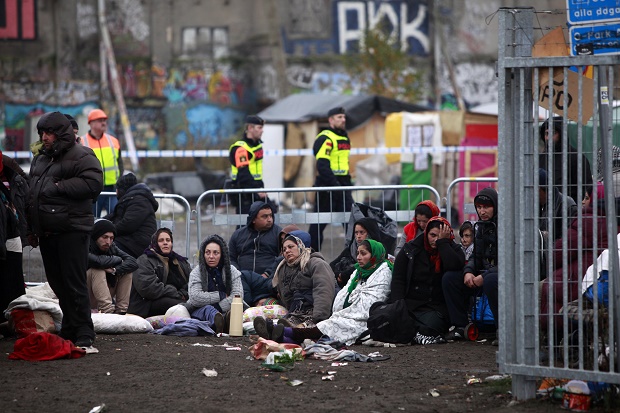Migration tests Sweden’s ‘humanitarian superpower’ image

Migrants sit on the ground as police clear a camp after an evacuation, in Malmo, Sweden, Tuesday, Nov. 3, 2015. Swedish police on Tuesday evacuated a Roma camp in the southern city of Malmo after a months-long standoff between city authorities and about 200 people who had settled there without permission. Dozens of people remained in the squalid camp despite a weekend deadline to move out after local authorities declared it an environmental and public health hazard. TT News Agency via AP
STOCKHOLM, Sweden—Overwhelmed by a massive influx of migrants, Sweden is approaching its fiscal and emotional limit and this “humanitarian superpower” is now being forced to hit the brakes.
The Scandinavian kingdom, in which one in every five residents is of foreign origin, is expected to receive up to 360,000 new immigrants in 2015 and 2016. That’s roughly the equivalent of Germany dealing with 3 million new migrants or 2.2 million arriving in France.
“The situation is no longer tenable. Sweden can no longer take refugees in the way it has before,” Prime Minister Stefan Lofven warned this week.
Earlier this year, Lofven was still ruling out the idea of setting a limit on migration.
Immigration Minister Morgan Johansson reiterated the government’s line when he said: “We cannot guarantee housing to all refugees. If you have a roof over your head in Germany, then it’s probably best for you to stay there.”
Article continues after this advertisementIn a sign of the problems involved in dealing with the huge influx, the Migration Agency reported that it had to set up beds for 50 migrants at its own headquarters on Thursday night.
Article continues after this advertisement
Redistribution of migrants
In a bid to address the urgency of the situation and to put a lid on public spending, the Ministry of Finance began suggesting that development aid be cut by up to 60 percent in next year’s budget to help pay for the influx.
Then, turning towards the EU, Sweden is seeking to relocate some of its asylum applicants to other EU Countries.
Brussels unveiled a plan in September for the redistribution of nearly 160,000 migrants and refugees from frontline states Italy and Greece. So far, only a small number have been relocated.
The EU plan was also to have seen 54,000 migrants and refugees relocated from Hungary.
But Hungary, along with several other eastern European countries, rejected the compulsory quota plan out of hand—and Sweden is now very eager to take advantage of the offer made to Budapest for relocating some of its own asylum seekers.
Finally Stockholm has said it would like to receive special financial assistance from the European Commission.
Since the 1950s, Sweden has become a coveted destination for immigrants.
Before that, more than a million poor peasants and workers migrated to North America from Sweden between 1840 and 1930.
Last year the then prime minister Fredrik Reinfeldt, a conservative, presented the country as a “humanitarian superpower.”
One year later, his party fiercely supports stemming the flow of migrants.
Welfare state cuts
Because of the welfare cuts made over the past 25 years, the generous “Swedish model” is being challenged.
Now Sweden, with its economy coming in at 17th per capita, according to World Bank figures last year, can no longer afford its ambitions.
Many of the most recent asylum seekers are sleeping on concrete floors in disused warehouses or in prisons.
Hospitals, schools and social services are overcrowded and longtime immigrants, plagued by high unemployment, are being crammed into poor suburbs.
“It’s nice to play good Samaritan, but in the suburbs we stand outside of the system,” said Alex Ngabo, a community activist in Tensta, a suburb north of Stockholm, where 87 percent of residents are from immigrant families.
Up to now, the government announcements have not had the desired effect.
More than 1,700 asylum applications were filed Wednesday, almost beating Sweden’s daily record—which was set last month.
Lofven negotiated with opposition parties in October to set restrictions on migration, which would apply only at the end of next year.
Polls indicate that the anti-immigrant Sweden Democrats are benefiting most from the growing tensions.
The Social Democrats have lost support among the poorer sections of society, those perceived to be the most exposed to the unprecedented influx.
As a former welder and trade unionist, the prime minister knows he is leading his party across a social and economic tightrope.
“Since the crisis of the 1990s, the Social Democrats have contributed to deconstruct the welfare state when they were in power and failed to defend it when they were in opposition,” said Stefan Jonsson Institute Migration Research at the University of Linkoping.
RELATED STORIES
EU predicts 3 million more migrants could arrive by end 2016
EU fails to reach migrant deal as countries impose border checks